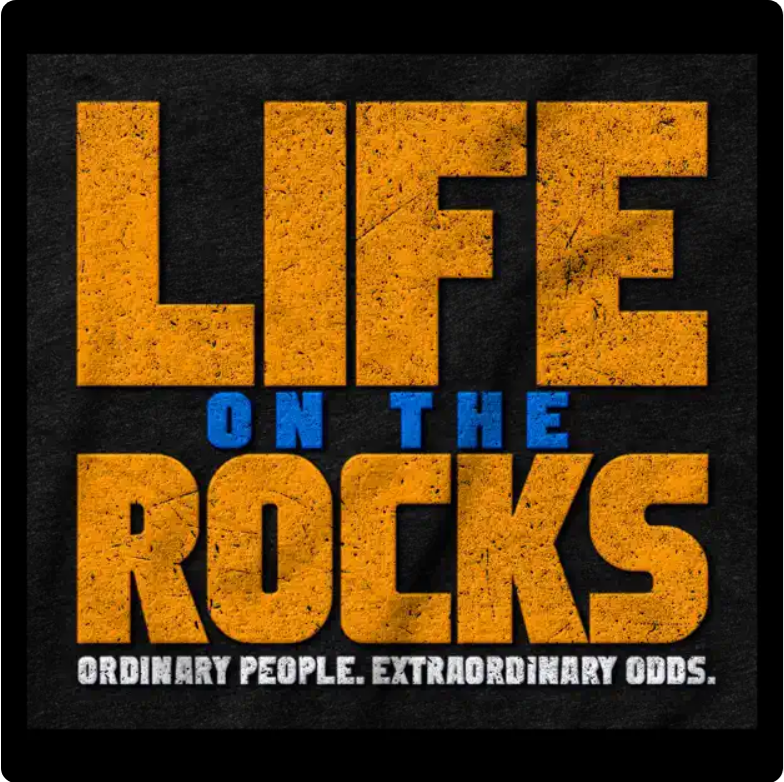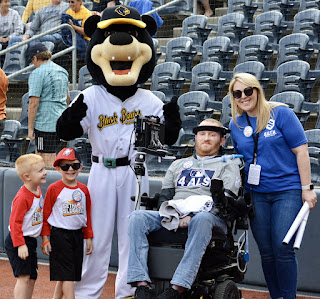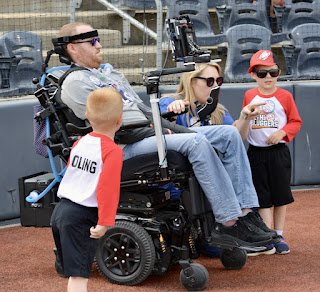Life On the Rocks- Kyle Miller with Seth Poling

KYLE: These are questions I'm sure you have been asked, but I would like to know. Share how you found out about you having ALS and how you reacted.
SETH: ALS affects everyone differently, so the diagnosis process is often long drawn out. For me, I first noticed a small muscle twitch in my right shoulder while on a cruise in 2014. I brushed it off and chalked it up as a possible symptom of an old injury. After 6 months of continuous twitching and some pain in my shoulder, I decided to see an Orthopedic Surgeon. The orthopedic surgeon scheduled an MRI which showed a torn rotator cuff and labrum. The surgeon suggested surgery, but advised that I should see a Neurologist prior to surgery to have the twitching looked at further.
I went to my first Neurologist appointment at Ruby Memorial hospital in May 2015, without a care in the world. I had no idea that mine and my family's lives were about to be changed forever. The Neurologist examined me and determined that I was now twitching in my left tricep, tongue and right shoulder. He showed a general concern, but didn't elaborate. He suggested that I have an (EMG) performed to better understand why I was twitching. Immediately after the (EMG); the Neurologist said he could not say with 100% clarity, but he feared that I showed the early signs and symptoms of ALS. Erika and I were floored. I had only heard of Lou Gehrig the baseball player and the Ice Bucket Challenge from the year before.
We left the appointment in total disbelief and decided to seek a second opinion. I scheduled an appointment with an ALS specialist at Cleveland Clinic during November 2015. I left that appointment with more questions than answers. We received zero clarification as to if I truly had ALS or not. The only way to diagnose ALS is through symptom diagnostics, there is not a single test that says with 100% clarification yes or no. I shared a few symptoms of ALS, but not enough to say definitively. I basically refused to believe I had ALS and carried on with my life for the next 1.5 years.
Over the next 1.5 years, I started to notice that my speech would slur when I was tired. My family suggested that I seek another opinion. I scheduled an appointment with a leading ALS specialist at Johns Hopkins in June 2017. After being examined by a specialist, he confirmed our worst fears that I in fact had ALS.
KYLE: Please explain the thoughts that went through your head and how you decided to handle it.
SETH: For the first couple of years, I was in denial. I refused to believe that I had a terminal illness. I was grasping for any diagnosis that wasn’t ALS. As time progressed, so did my symptoms. At some point, I realized through symptoms and research into ALS, that I unfortunately had every symptom. That was during a break from any doctors because honestly, what could they do? Upon receiving my official diagnosis, I went into ultra health saving mode. I cut all unhealthy habits and tried to stretch and exercise. More than anything, that was the beginning of this mental and emotional journey that I am still on.
KYLE: Please share the story of the following: take me from happy go lucky Seth to knowing something was up. The fight, the struggle every day that you go through. Please share if you can.
SETH: The entire process leading up to my early symptoms was such a whirlwind. I absolutely believed everything I was experiencing was directly related to my torn rotator cuff. I was still in denial when I started to twitch in my left arm. I went to see an orthopedic surgeon for a cortisone shot for my right shoulder, the initial symptom onset starting point. I asked the doctor to examine my left shoulder. It seemed to show a partially torn rotator cuff. I thought, oh lucky me. I have two messed up shoulders.
Over the next six to eight months my twitching spread down my arm’s and into my upper back. I would have occasional cramps in my forearms. The first red flag for me was that I started to notice twitching in my tongue. The most alarming part was that I would get severe cramps in my throat and tongue. It would be so severe that I would throw up trying to clear my throat. I knew something was wrong. This wasn’t normal. Now the panic and realization that the far flung idea of ALS was a real possibility.
By this point, I was twitching everywhere except for my left leg. I had considerable weakness in my right hand and arm. My left hand was starting to cramp. My tongue was clumsy. My voice was hoarse. I had to use a device that looked like a large Swiss Army Knife. Except this device was literally a life saver. It was a button and zipper assist. It opened up to reveal different hooks and an open ended grasp. Without this device, I couldn’t button or more importantly, unbutton my pants. Try being alone in public or at work and you have to ask another adult to help you unbutton and zip your pants. Humiliating, demoralizing, painful. That weighs on a person. Suddenly, your independence takes a quick punch to the gut.
KYLE: Did you ever feel sorry for your situation? Do you ever feel like why me? Why do I need to go through this?
SETH: I can’t say that I haven’t thought, why me? But, generally it’s a fleeting thought. I’m a firm believer that everything happens for a reason. Good or bad. My thought process is that bad things happen to those who can handle such adversity. Unfortunately, but fortunately, God blessed me with an extremely bull headed and mentally tough deposition. I think growing up playing sports year round, instilled a don’t quit attitude in me. You’re going to lose, get hurt, get mad, get embarrassed, but never quit.
I took those life lessons to heart. In addition to sports molding my character, my parents and faith had a large impact on my attitude. My parents didn’t allow me to feel sorry for myself. My mother always told me, life’s a bitch, then you die. That was the unfiltered version of, life isn’t fair, get over it. I struggled with this lesson growing up. I had a horrible temper. But, thankfully it stuck with me and I learned to use my temper to my advantage.
Those are the reasons that I don’t say why me. As unfair as it may be, I feel like I can handle this situation and shed a light on a horrific disease.
KYLE: How have you gained the strength that you have to push forward knowing what comes at the end?
SETH: I try not to think about the “end”. I have a complete understanding of what my current diagnosis means. Instead I try to focus on the positive things happening in the ALS community. Such as ACT for ALS.
The Accelerating Access to Critical Therapies for ALS Act was signed into law on December 23, 2021.
This bill will establish:
(1) An Expanded Access grant program that funds research on and provides access to promising investigational treatments to people living with ALS who are not eligible for clinical trials.
(2) A public-private partnership for rare neurodegenerative diseases jointly led by the Food and Drug Administration (FDA) and the National Institutes of Health (NIH). This will be the first federal effort explicitly charged with speeding the development and approval of therapies for ALS and other rare neurodegenerative diseases.
(3) A rare disease grant program at the FDA that will fund research on and development of interventions to prevent, diagnose, treat or cure ALS and other rare neurodegenerative diseases.
ACT for ALS will fund essential research into fast-progressing rare neurodegenerative and terminal diseases, like amyotrophic lateral sclerosis (ALS), and early access to promising investigational therapies for patients suffering from them and would authorize $100 million annually to implement these priorities.
In addition to this legislation, promising potential treatments like NurOwn and AMX0035. These drugs have out had astonishing results in clinical trials, but the red tape the FDA requires for approval is ridiculous. As fellow ALS warrior, Super Bowl Champion New Orleans Saint Steve Gleason, says, "I knew I would lose the ability to speak and I knew I would lose the ability to eat on my own, but the power of technology could help solve the insurmountable challenges.
So, for now, I choose to live and enjoy my life. I live in the present with hope that a cure is just around the corner.
KYLE: What are you trying to leave for your kids, your family?
SETH: What am I not trying to leave for my family?
I want to leave great memories, determination, strength, endurance, perseverance and most importantly LOVE. I’m in a phase where I’m trying to take as many pictures and videos as possible. I want to have digital memories for everyone to cherish. I’m trying to upload any old pictures and videos. I’m searching everything for videos of me speaking. The harsh reality is that my boys won’t have any direct memories of me walking or talking. How crazy is it that I’ll never get to experience a real conversation with my boys. I can obviously talk to them through my eye gaze device, but it is a computerized voice. The boys understand that it’s me speaking, but it isn’t the same as an actual voice.
Instead, I have to find other ways to bond, such as the following: rides on my wheelchair, dance parties, movies and trips. Basically what I’m trying to leave behind is pieces of me. Hobbies, likes, dislikes, memories and life lessons.
KYLE: I’ve read some of your posts and how positive you are in your post. How do you keep it together?
SETH: I am a positive, upbeat individual. I’m always laughing and cracking jokes. All of the years that I spent being the class clown, has paid off in spades. Throughout this journey, I have tried to carry the burden of this disease. I have used humor and positivity to ease others' pain. I try to be a positive figure to inspire others. My social media presence works both ways, I get inspiration from others supporting my journey. It fuels my soul to keep enduring the Hell that I go through daily.
KYLE: What are your biggest struggles right now and how do you handle those times?
SETH: Great question. This is the hardest part of having ALS, in my opinion. The struggles. Everything is a struggle. Some of the most mundane tasks for you, have been internal meltdowns for me. I’ll share a few examples.
I can remember when my hands really started to become an issue, trying to purchase anything in public was a nightmare. First off, my fingers were so weak and had minimal dexterity. I could barely pull my wallet from my back pocket. Then, I had to use my fingernail to pull my card out. Now the work started.
My arms were so weak that I could barely reach up to the card reader. If I was lucky, I could use the chip reader. If not, I had to swipe. It took both hands to swipe. Then I quickly used both hands to make my pointer finger knuckle to stab at the numbers. Forget trying to sign. Typically, I had to repeat this process several times.
Another example is if you're laying in bed. You just get comfortable after your wife, just spent 20 minutes trying to get you just right. She walks away and turns the lights off. You close your eyes, and a bug lands on your nose. You can’t move your arms, legs or head. You're too weak to blow air. You can’t speak. The bug just crawled towards your mouth. You’re itching and can’t do anything about it
Are you frustrated yet?
I know that I am.
Those are just two small examples of a life filled with frustration. Frustration is my biggest and most difficult challenge. I’m 100% reliant on other people for everything. I need someone to help with suction, cough assist, feed me through my g tube, move any body part, use the bathroom and scratch itches. All without saying a word. Communication is extremely difficult even with my eye gaze device help.
Since I rely on other people, for literally everything, it’s easy to get frustrated with the smallest things. You know exactly what you need and how you like things. Now add in minimal sleep. You’re coughing and choking. You have to use the bathroom. Both kids are screaming. The dogs barking. The UPS guy is knocking on the door (Ben McGill). Your wife just got home from working all day. Everyone is stressed, anxious and most of all FRUSTRATED.
That is a small glimpse into life with ALS. It is the most frustrating, life altering, experience that I have ever encountered. I cry every day, not from pain, but frustration. Mind bending, body shaking, teeth grinding frustration.
KYLE: What do you want your children to learn from this?
SETH: I want my children to learn SO much from this journey. I want them to learn three main things. Humility, gratitude and perseverance. The hardest lessons that I’ve had to learn is humility. I foremost had to forget dignity. I had to put my dignity to the side. Nothing is more humbling than having another adult wipe your butt. That’s a tough pill to swallow regardless of your age.
I’ve been so blessed throughout this journey with others' love , support and generosity. People have been amazing in supporting me and my family. It’s unlikely that my quality of life would be anywhere comparable to what it is currently without others' support. I’m grateful to have friends and family who support me and my family.
Life is full of peaks and valleys, it’s not a matter of if you will experience hardships, but when you will experience hardship. Maybe you will fall down at school. Maybe you ask your first crush out, but they say no. Maybe you don’t make the cut for your sports team. Maybe you got fired from work. Maybe you receive the dreaded call from your doctor saying you only have 6 months to live.
What do you do?
Do you give up and quit?
I don’t know about you, but I don’t have much quit in me. Hardship and adversity shall not define us. Adapt and overcome. Prevail in the face of adversity. The fact that I was dealt a tough hand, doesn’t mean that I can’t love and enjoy my life. I refuse to let this disease define me. Through humility, gratitude and perseverance all things are possible. I hope that my children learn those key points along with many others.
Love, laugh and be kind to others.
KYLE: Why did you start the SETH Project? What’s your goal? Who are you trying to impact?
SETH: I started the SETH Project because I saw the need to spread awareness about a devastating debilitating disease. I’ve had so many experiences with every walk of life, who don’t have a clue what ALS is. I’ve been spoken to loudly because people think that I’m deaf or mentally challenged. I’ve had people tell me, at least it isn’t cancer. Really? Cancer’s horrible, but they’re treatments. ALS is 100% deadly. No ifs, ands or buts about it. I wanted to change that through education and advocacy.
My goal is to raise awareness for ALS and motor neuron disease through education and advocacy. I hope that the scholarship fund at my Alma Mater, Buckhannon-Upshur High School, will have a direct effect on the future of ALS. The recipient is required to go into a (STEM) based field. (STEM) stands for Science, Technology, Engineering, and Mathematics. Secondly, the SETH Project will support research and development of life saving treatments through donations to leading ALS advocacy groups and research facilities. Such as I am ALS and (ALSTDI). Thirdly, we plan to set up a volunteer program with local colleges and tech schools, to have (STEM) degree students volunteer to work directly with (MND) patients. That exposure is beneficial for the student and patient.
I’m trying to impact as many people as possible. The adage, out of sight, out of mind, is a prime example of ALS. No one knows anything about ALS, until it happens to them. The more exposure people get to ALS, the closer we become to a cure. Together we can help end ALS.
KYLE: How can people find you and follow your journey?
SETH: People can follow my journey on every major social media platform such as the following: Facebook, Instagram, Twitter and YouTube. You can find me by searching for Seth Poling or sethpoling10. I recently found a great platform called Beacons. As the name suggests, it shines a light on all of my accounts on one simple to use website. You can find my social media accounts. My new blog is on there. I plan to write 2 or 3 blogs per month about my life. You can also find a few publications with links to stories about me. I also have a few links to ways that my followers can donate to help me with any medical or care expenses that I encounter. The cost of living with ALS is extremely expensive. I have a heavy online presence as I try to educate and advocate for ALS. Please consider following my journey and helping me end ALS.
https://beacons.ai/sethpoling10
https://podcasts.apple.com/us/podcast/seth-polling-strength-like-no-other/id1609534129?i=1000565464393




Comments
Post a Comment